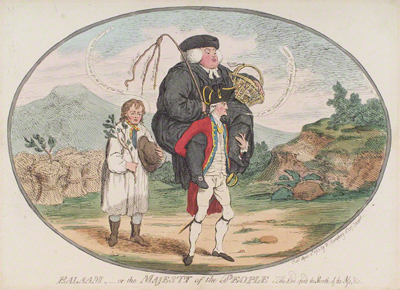Balaam, or The Majesty of the People
The story of Balaam and the ass referred to in the title and subtitle of this print comes from Numbers: 22. There Balaam is on his way to meet with Balak, a Moabite and an enemy of the Israelites. But the ass on which he is riding keeps stopping and turning away from the path. Three times she stops and three times she is beaten by Balaam.
And the Lord opened the mouth of the ass, and she said unto Balaam, What have I done to thee, that thou hast smitten me these three times.

© National Portrait Gallery, London
It is only then that an angel of the Lord appears and explains to Balaam that the ass is resisting because she is following the will of the Lord.
In Gillray's version of the tale, Balaam is a grotesquely fat and pampered clergyman carrying a basket of chickens and a sucking pig that he has just collected as part of his tithe. The "ass" that Balaam is riding is is a lean-looking "independent country gentleman and Colonel of the militia." accompanied by a poor John Bull-like farmer with his hat in one hand and a tithe marker(?) in the other who explains that "We farmers have our Bodys Eat up, for the good of our Souls." How low has the "Majesty of the People" fallen!
Gillray had been critical of the wealth of the Anglican Church and its addiction to material comforts in his 1779 print, The Church Militant. In that print the words of the national anthem had been perverted by the church hierarchy to a plea for endless supplies of meat and drink. Here, he portrays a church that continues to use a whip of three lashes labeled: "Pious Fraud," "English Statutes," and "Popish Canons" to support a practice (tithing) that literally rides upon the labors of others.
As the son of a dissenting church sexton, Gillray may have been more sensitive than most to the inequities of tithing. For though the collection of tithes affected every farmer, the benefits went only to members of the Anglican clergy.
Gillray may have had a specific instance in mind. The Colonel, though lean, does not appear to be a type, but a specific portrait caricature. But I have been thus far unable to identify him. The fact that he is independent gentleman and a member of the militia, however, suggests that the critique has a patriotic component. The church is unnecessarily burdening the very people who are already sacrificing for their country.
Sources and Reading
- Commentary from the British Museum on Balaam, or The Majesty of the People
- "Balaam" Wikipedia
Comments & Corrections
NOTE: Comments and/or corrections are always appreciated. To make that easier, I have included a form below that you can use. I promise never to share any of the info provided without your express permission.